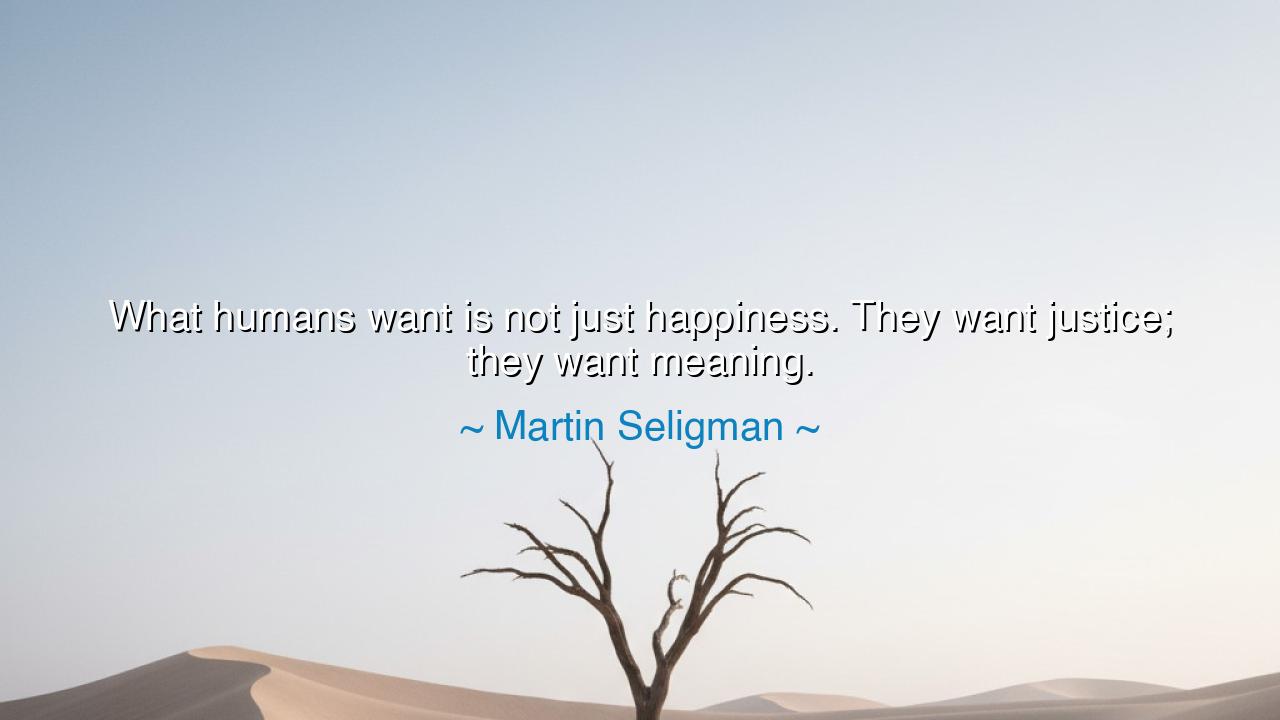
What humans want is not just happiness. They want justice; they






In the days of old, when the fires of wisdom burned bright upon the altars of thought, men sought to understand the nature of their longing. From the beginning, the human heart has been restless — not merely hungering for happiness, but yearning for something deeper, something nobler. It is this truth that Martin Seligman, the father of positive psychology, uttered when he declared: “What humans want is not just happiness. They want justice; they want meaning.” In those few words, he struck the chord that resounds through the ages — that joy without purpose is hollow, and pleasure without righteousness fades like mist before the morning sun.
To understand this saying is to gaze into the soul of humanity itself. Happiness is the wine of life, sweet yet fleeting; justice and meaning are its bread and roots, enduring through storms and famine. A man who pursues only happiness will find himself adrift upon the sea of his own desires, tossed by every wind of circumstance. But a man who seeks meaning — who aligns his life with truth, with goodness, with the cry for justice — finds a harbor even in sorrow. For there is a joy greater than pleasure: the quiet fire of knowing that one’s life stands for something eternal.
Consider the tale of Nelson Mandela, imprisoned for twenty-seven long years in the cold shadow of injustice. The world might have expected him to break, to curse the fate that stole his freedom. Yet in that long night of chains, he found meaning — the belief that his suffering bore witness to a greater justice. When he emerged, he did not seek revenge, but reconciliation. In him we see the truth of Seligman’s words: happiness may be denied, but meaning can flourish even in despair; justice can be born from the ashes of pain. Mandela’s joy was not the laughter of ease, but the triumph of the soul that has endured and still chooses love.
The ancients knew this too. In the Greek tragedies, heroes sought not comfort but glory, not ease but virtue. Achilles, though warned that his quest for honor would bring an early death, chose it nonetheless — for to him, a life without meaning was worse than no life at all. He reminds us that the human spirit does not live by pleasure alone; it craves purpose, the fire that gives light to existence. The wise of every age have whispered the same: that a life well-lived is one in which justice and meaning stand above comfort, where one’s heart burns with the desire to leave the world more whole than it was found.
There is also a quieter kind of meaning — the kind born not of war or fame, but of compassion. Think of a mother tending her sick child through sleepless nights, her face lined with fatigue yet lit by love. She does not smile because life is easy, but because her sacrifice gives her days a sacred weight. Her joy is not born of amusement, but of purpose. Here lies the essence of human fulfillment: to live for something beyond oneself.
Thus, Seligman’s words are both a mirror and a call. They remind us that true happiness is not an end in itself, but a byproduct of a life anchored in justice and meaning. The pursuit of pleasure without purpose leaves the soul empty, while even pain can be transfigured into strength when it serves a righteous cause. The heroes, the sages, the lovers, and the martyrs — all knew this secret: that meaning redeems suffering, and justice ennobles the human heart.
And so, let this be the lesson passed down to you, O listener of the ages: seek not merely to be happy, but to be whole. Live so that your joy is born from integrity, your peace from compassion, your satisfaction from service. When faced with choice, ask not, “Will this make me happy?” but rather, “Will this give my life meaning? Will it bring justice into the world?”
For in the end, happiness is like a shadow — it follows those who walk toward meaning. Let your days be guided by that higher flame, and though you may stumble or grieve, your heart shall not be empty. The gods themselves, it is said, smile upon those who live not for ease, but for purpose.






AAdministratorAdministrator
Welcome, honored guests. Please leave a comment, we will respond soon